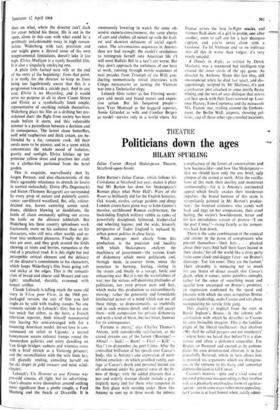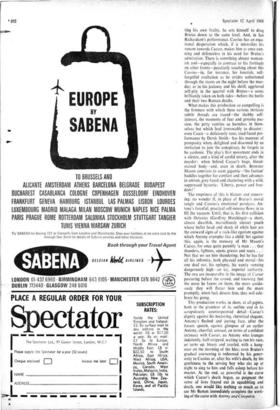THEATRE
Politicians down the ages
HILARY SPURLING
Julius Caesar (Royal Shakespeare Theatre, Stratford-upon-Avon) John Barton's Julius Caesar, which follows his Coriolanus at Stratford last year, makes it plain that Mr Barton has done for Shakespeare's Roman plays what Peter Hall's Wars of the Roses so brilliantly did for the English histories. Oak woods, castles, cottage gardens and dingy London streets have given way to John Gunter's massive, earthbound Roman architecture; the backsliding English military rabble to ranks of powerfully disciplined, helmeted, leather-clad and wheeling legions; and the wide, leisurely perspective of Tudor England is replaced by urban power politics in close focus.
What emerges most clearly from this production is the precision and lucidity with which Shakespeare analyses the machinery of government—the various kinds of dishonesty which move politicians and, through them, in coarser form, move the populace to burning, looting, rioting in the streets and finally to a savage, futile and exhausting war. But it is not the wastefulness of war, nor the vicious self-deceiving platitudes of politicians, nor even private pain and fear, which make this production so extraordinarily moving: rather the generosity and formidable intellectual power of a mind which can see all these things, so dispassionately, so truthfully and in such minute detail, and can still accept them—with compassion for private dishonesty and with a kind of bleak, but not bitter, humour for its consequences.
'Fortune is merry,' says Charles Thomas's Antony, with considerable satisfaction, as the crowd streams out of the forum ('Revenge!— About! — Seek! — Burn! — Fire! — Kill! — Slay! ') to dismember the poet Cinna. After the controlled brilliance of his speech over Caesar's body, this is Antony's one expression of unin- hibited emotion—in which gratified vanity, out- rage at Caesar's death and personal hatred are all subsumed under his general sense of the fit- ness of things; with the added pleasure that a just and orderly revenge should include a par- ticylarly nasty end for those who tampered in the first place with existing order. How like Antony to sum up in three words the infinite
complacency of the forces of conservatism; and how business-like—and how like Shakespeare— that we should have only the one brief, ugly glimpse of the crowd at work. After the vacilla- tions of this mob, their docility and monstrous sentimentality—for it is Antony's sentimental appeal which finally awakes their murderous impulses—the brutal humour of this scene is scrupulously pointed in Mr Barton's produc- tion: the frenzied citizeness who stands well back and eggs on her companions, their cruel baiting, the victim's bewilderment, terror and his last incredulous scream of protest—'I am the poet Cinna!'—rising faintly as his tormen- tors hack him down.
There is the same combination of the comical and sinister in the posse of conspirators who present themselves—'their hats . . . plucked about their ears/And half their faces buried in their cloaks,' for all the world like a stray party from some cloak-and-dagger farce—on Brutus's doorstep: 'Let 'em enter. They are the faction.' Their absurdity is menacing not so much for any threat of direct assault (for Caesar's death, when it comes, seems pointless enough), rather for the sense of something mean and squalid now encamped on Brutus's premises; an impression confirmed by the speed and pleasure with which the once scrupulous Brutus assumes leadership, snubs Cassius and sets about manipulating his servile little gang.
This alacrity is implicit from the start in Barrie Ingham's Brutus—in the solemn self- satisfaction with which he describes to Cassius his own invincible integrity. This is the familiar plight of the liberal intellectual—that idealism ('We shall be called purgers and not murderers' — where have we heard that before?) is a dan- gerous and often a dishonest councillor. For Brutus, so flustered and excited as he contem- plates his own disinterested altruism, is in fact powerfully flattered; which in turn allows him to proceed via arguments which are disingenu- ous in the extreme to his hasty and somewhat dubious decision to kill Caesar.
Cassius's motives—spite and a vivid sense of personal grievance masquerading, as they so often will, as a peculiarly unattractive form of egalitar- ianism—are in some ways rather more appealing; for Cassius is at least honest when, tacitly admit- tin his own frailty, he sets himself to drag Brutus down to the same level. And, in Ian Richardson's performance, Cassius has an emo- tional desperation which, if it intensifies his venom towards Caesar, makes him at once cun- ning and defenceless in his need for Brutus's admiration. There is something almost woman- ish and—especially in contrast to his fortitude on. other fronts—peculiarly touching about this Cassius—in, for instance, his feverish, self- forgetful exultation as he strides unbuttoned through the storm on the night before the mur- der; or in his jealousy and his shrill, aggrieved self-pity in the quarrel with Brutus—a scene brilliantly taken on both sides—before the battle and their two Roman deaths.
What makes this production so compelling is the firmness with which these various intricate subtle threads are traced—the shabby self- interest, the moments of fear and genuine pas- sion, the petty vanities so harmless in them- selves but which lead irrevocably to disaster: even Casca—a deliciously sour, toad-faced per- formance by Derek Smith—has his moment of pomposity when, delighted and disarmed by an invitation to join the conspiracy, he forgets to be sardonic. The play's first movement ends in a silence, and a kind of sordid misery, after the murder: when behind Caesar's huge, blood-. stained body—and, even in death, Brewster Mason contrives to seem gigantic—`the faction' huddles together for comfort and then advances in unison, grey-faced and chattering with a wild, suppressed hysteria : 'Liberty, power and free- dom!'
The emptiness of this is blatant and unnerv- ing; no wonder if, in place of Brutus's moral tangle and Cassius's emotional paralysis, An- tony's forceful, practical self-interest flows in to fill the vacuum. Until, that is, his first collision with Octavius (Geoffrey Hutchings)—a short, almost dwarfish, marvellously sinister youth whose bullet head and shock of white hair are the outward signs of a rock-like egotism against which Antony crumples like a child: Set against this, again, is the memory of Mr Mason's Caesar, for once quite patently 'a man ... that thunders, lightens, opens graves and roars . . Not that we see him thundering; but he has for all his infirmity, both physical and moral—his one deaf ear, his epilepsy, his vanity running dangerously high—an icy, imperial authority. The two are inseparable in the image of Caesar posturing before the crowd, and knowing that the more he fawns on them, the more assidu- ously they will flatter him and the more promptly, when luck deserts him, they will cele- brate his going.
This production works, in short, at all pqints, both in the grandeur of its outline and in its scrupulously counterpointed detail—Caesar's dignity against his hectoring, rhetorical slogans; Antony's flushed and jeering face, after the forum speech, against glimpses of an earlier Antony, cheerful, sensual, on terms of confident intimacy with Caesar, an Antony who lounges indolently, half-stripped, waiting to run his race, or turns up, bleary and tousled, with a hang- over on the morning of the Ides; even Brutus's gradual coarsening is redeemed by his gener- osity to Cassius or, after his wife's death, by his gentleness to the serving boy who sits up at night to sing to him and falls asleep before his master. At the end, so powerful is the curse which Caesar's death began, so poignant the sense of lives frayed out in squabbling and death, one would like nothing so much as to see Mr Banton immediately complete the work- ing of the curse with Antony and Cleopatra.











































 Previous page
Previous page